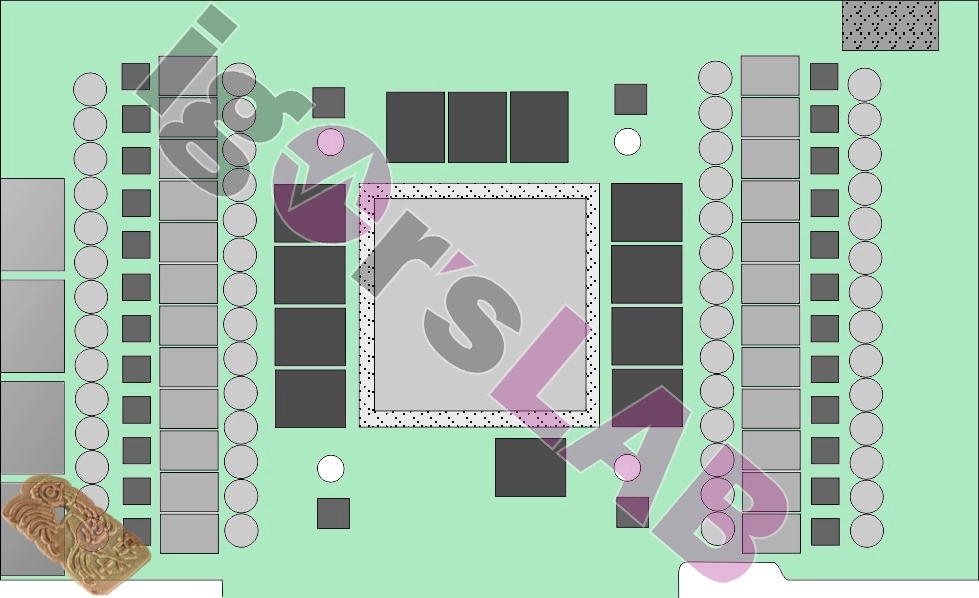Nvidia RTX 4080 / 4090 leaks point to extremely power hungry cards
Those 600W+ TDP rumours are looking more and more likely.

The launch of Nvidia’s next gen Lovelace GPUs draws nearer, and that means it’s leak season! A purported approximation of the RTX 4080 and RTX 4090 Founders Edition PCB has hit the web, and it gives us a lot to ponder. The first thing to consider is the VRM phase count. With no less than 24 phases for what is likely a standard Founders Edition card, it’s clear that talk of very high TDPs for high end RTX 40 cards is accurate.
The leak comes via Igor’s Lab. The PCB overview indicates that the card includes space for 12 GDDR6X memory chips. This would indicate that the RTX 4090 will include 24GB of VRAM while the RTX 4080 will include 12GB, likely over a 384-bit bus. That’s the same as what’s available now.
Igor's Lab believes that the GA102 and next gen AD102 GPUs are pin-to-pin compatible. This means that manufacturers can re-use their current high end designs and that upcoming RTX 3090 Ti PCBs will likely carry over to RTX 4080 and RTX 4090 class cards. The 3090 Ti is also set to introduce the PCIe 5.0 power connector. If we assume the rumoured 450W+ TDP of the 3090 Ti is accurate, then it can be considered something of a test run before the main RTX 40 event.
Lovelace GPUs are set to be manufactured on TSMC's 4N fabrication process which is tweaked specifically for Nvidia. Despite the significantly smaller node, those rumours of 600W or even higher TDPs just won’t go away. Bear in mind we’re talking about the enthusiast class cards here, where power consumption is typically secondary to performance. We hope that the mid range and entry level cards will end up a lot more power thrifty. Imagine the hassles system integrators will face if they have to accommodate a 300W entry to mid level GPU.


Best CPU for gaming: The top chips from Intel and AMD
Best gaming motherboard: The right boards
Best graphics card: Your perfect pixel-pusher awaits
Best SSD for gaming: Get into the game ahead of the rest
All of this information is subject to change. We’re still many months away from the launch of the RTX 40 Lovelace cards. Nvidia still has time to fine tune the PCB design, clocks and power consumption of the GPU. Whatever final form the Founders Edition card takes, it’s clear the cards will be power hungry and hot. Partner cards will be even more so. Let’s hope they offer the performance to justify it.
Before the launch of RTX 40 cards, there’s Intel’s Alchemist cards to come. Though they’re not expected to offer flagship tier performance, if they are priced right, and they have a good level of performance and driver maturity, they could end up very popular. There’s also the upcoming refresh of AMD’s RX 6000 range. That’s before AMD launches its RTX 40 competing RDNA 3 series of cards later in the year.
While 2021 might have been a lost year for PC gamers, the second half of 2022 is looking mighty, especially if the ongoing downward trend in GPU prices continues.
The biggest gaming news, reviews and hardware deals
Keep up to date with the most important stories and the best deals, as picked by the PC Gamer team.

Chris' gaming experiences go back to the mid-nineties when he conned his parents into buying an 'educational PC' that was conveniently overpowered to play Doom and Tie Fighter. He developed a love of extreme overclocking that destroyed his savings despite the cheaper hardware on offer via his job at a PC store. To afford more LN2 he began moonlighting as a reviewer for VR-Zone before jumping the fence to work for MSI Australia. Since then, he's gone back to journalism, enthusiastically reviewing the latest and greatest components for PC & Tech Authority, PC Powerplay and currently Australian Personal Computer magazine and PC Gamer. Chris still puts far too many hours into Borderlands 3, always striving to become a more efficient killer.